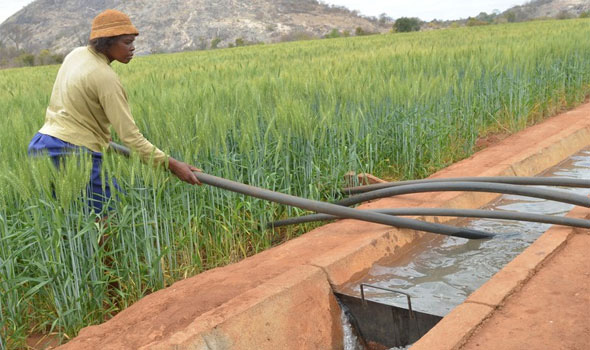Record wheat harvest on the horizon
The Ministry of Agriculture, Lands, Water and Fisheries has assured the nation that wheat self-sufficiency will be achieved this year despite the recent electricity hiccups currently being felt across the country as harvesting commences.
“Yes, the crop is good, we have done some assessments and our projections are that we should get about 380 000 tonnes of the cereal, which is 20 000 tonnes more than the national requirement,” the Deputy Minister for Agriculture, Lands, Agriculture, Fisheries, Water and Rural Development Vangelis Harritatos said.
More than 70 000 hectares were put under wheat during the 2022 winter season compared to 66 000 hectares last season and this is expected to produce self-sufficiency with a small surplus for the first time since wheat farming started in Zimbabwe in 1966.
The deputy minister confirmed that harvesting has already begun this month with most of the harvesting commencing in November; “Harvesting will begin this month with a few farmers like me, then others will start in the coming month,” he said.
In the past two weeks, ZESA Holdings battled to generate adequate power due to a fault at Hwange Power Station, which affected the electricity supply across the country.
The Government has, however, reiterated its commitment to ensuring wheat farmers get uninterrupted power supply after making swift interventions to address supply challenges experienced during the past week.
“We have a big challenge here. We have been promised adequate power from the beginning of the season, but this development where power is becoming rampant is not good for our yields per hectare. We appeal to the government to continue giving us priority until the crop is matured,” said Macheke Farmers Association chair, Bright Ruzvidzo.
“As you are aware, the bulk of the wheat crop now requires adequate irrigation. What happened last week should be avoided at all costs because farmers cannot afford to lose their wheat crop in the face of global shortages as a result of the Ukraine war,” noted Paul Zakaria, Zimbabwe Farmers Union secretary general.
The government has assured wheat farmers that adequate power has been ring-fenced to ensure full water cycles for irrigation.
“We have received reports of power outages countywide, but farmers are assured of the electricity to keep them on the fields. We have just recovered some of our major thermal power stations, so, starting this week, everything will be ordered,” said Honourable Soda Zhemu, the Minister of Energy and Power Development.
Deputy minister Haritatos sentiments have been shared across by many other industry players including farmer’s unions and millers.
Chief director, agricultural advisory and rural development services in the Ministry of Lands, Agriculture, Fisheries, Water and Rural Development, Professor Obert Jiri said “The bumper harvest has to be applauded to both private and public operators as they all came hands on deck to help the nation achieve the anticipated bumper harvest.”
Tafadzwa Musarara, “The quality of our local wheat is good and comparable with the regional wheat and it is doing well in the production of biscuits and a number of other products. In relation to bread, we have to mix varieties to give use good durable bread such as Russian wheat flour.”
The country has been using Russian,
Canadian and Australian wheat for the past 20 years to blend with local wheat for bread
flour.
Musarara added that the country was importing wheat for two reasons that is firstly to mitigate flour shortages between national demand and production. Secondly, the country needed different varieties in order to make durable tasty bread as we need 30 percent foreign flour per each loaf.
Prof Jiri added that the wheat will be enough to feed the nation but we will definitely export some in order to import blending wheat.-ebusinessweekly











